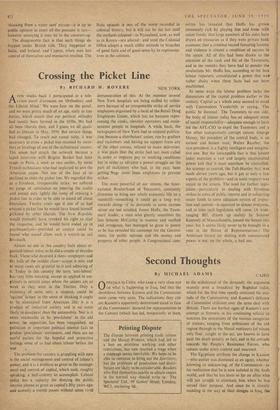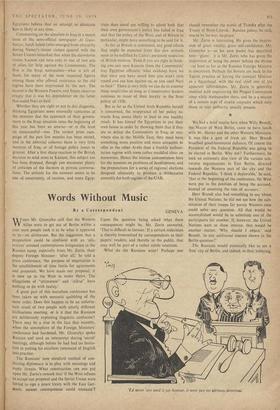Second Thoughts
By MICHAEL ADAMS CAIRO
FFICIALS in Cairo, who keep a very close eye
on what is happening in Iraq, feel that the showdown between Kassem and the Communists must come very soon. The indications they cite are Kassem's apparently determined stand in face of the Communists' demand for representation in the Cabinet (which has led, temporarily at least, to the withdrawal of the demand); the argument recently over a broadcast by Baghdad radio, which for the first time openly criticised the atti- tude of the Communists; and Kassem's defiance of Communist criticism over the arms deal with Britain. There are further signs of Kassem's new attempt at firmness in his continuing refusal to sanction the executions of the various categories of traitors, ranging from politicians of the old regime through to the Mosul mutineers (of whom only four, caught in the act, are known to have paid the death penalty so far), and in his attitude towards the People's Resistance Forces, who remain under army control and unarmed.
The Egyptians attribute the change in Kassein
-who earlier was dismissed as an agent, whether knowing or unknowing, of the Communists—to his realisation that he is now isolated in the Arab world, and that he has leant so far on allies who will not scruple to eliminate him when he has served their purpose. And since he is already standing in the way of their designs in Iraq, the
Egyptians believe that an attempt to eliminate him is likely at any time.
Commenting on the situation in Iraq in a recent issue of the semi-official newspaper Al G um- huriye, Salah Salem (who emerged from obscurity during Nasser's recent violent quarrel with the Soviet Union) remarked that when the showdown comes Kassem can turn only to one of two sets of allies for help against the Communists. The first is the Iraqi nationalists—what is left of them, for many of the most respected figures among those who offered resistance to the old regime have been imprisoned by the new. The second is the Western Powers, and Salem observes crisply that it was his dependence on the latter that undid Nuri es-Said.
Whether they are right or not in this diagnosis, thinking Egyptians seem unusually conscious at the moment that the approach of their govern- ment to the Iraqi situation since the beginning of this year has been an unwise—or at the least an unsuccessful—one. The violent press cam- paign of the past few months has been muted, and in the editorial columns there is very little mention of Iraq, or of foreign policy issues in general. After a first sharp reaction to the British decision to send arms to Kassem, this subject too has been dropped, though you encounter plenty of criticism of the decision in private conversa- tions. The attitude for the moment seems to be one of uncertainty, of caution, and more Egyp- tians than Usual are willing to admit both that their own government's policy has failed in Iraq and that the policy of the West, and of Britain in particular, might have something to be said for it.
As far as Britain is concerned, any Food effects that might be expected from this new attitude seem to be nullified by Cairo's persistent suspicion of British motives. 'Even if you are right in think- ing you can save Kassem from the Communists' (say Egyptian officials) 'what evidence have we that once you have saved him you won't turn round and use him against us, as you used Nuri es-Said?' There is very little we can do to counter these suspicions as long as Conservative leaders continue to boast of their loyalty to the Suez policy of 1956.
But as far as the United Arab Republic herself is concerned, the reappraisal of her policy to- wards Iraq seems likely to lead to one healthy result. It has forced the Egyptians to put their own house in order by showing them that if they are to defeat the Communists in Iraq, or any- where else in the Middle East, they must have something more positive and more attractive to offer to the other Arabs than a frankly authori- tarian regime with some rather muddled ideas on economics. Hence the intense concentration here for the moment on problems of development, and the preparations for a series of regional elections designed ultimately to produce a deliberative assembly for both regions of the UAR.







































 Previous page
Previous page